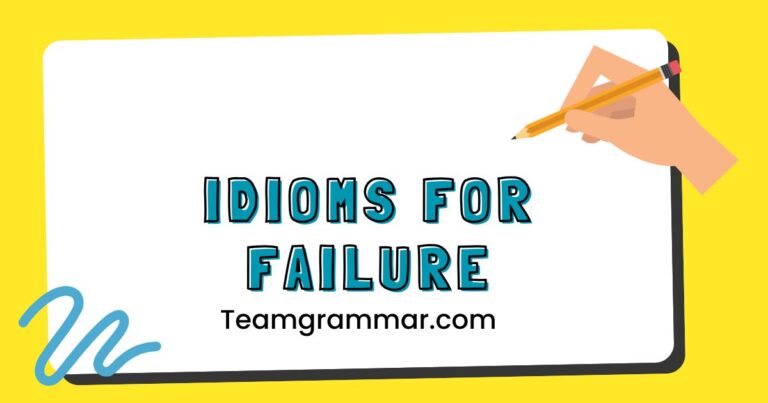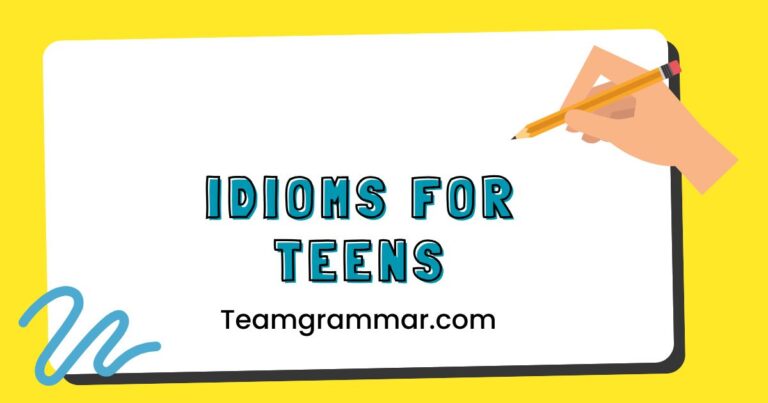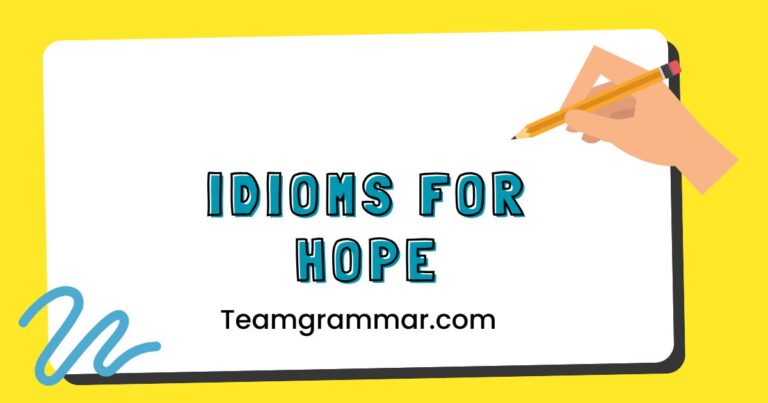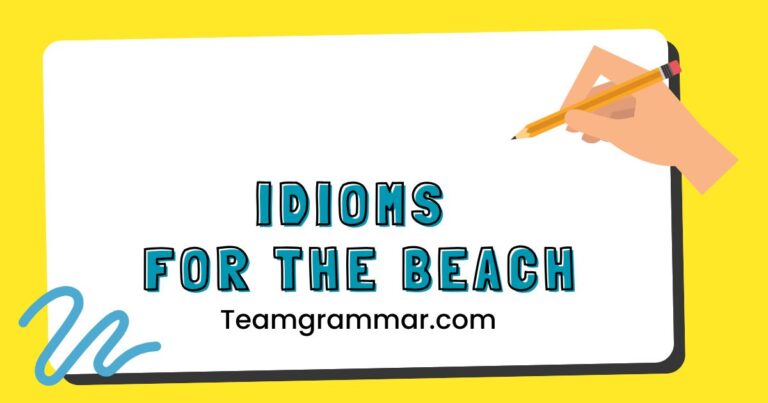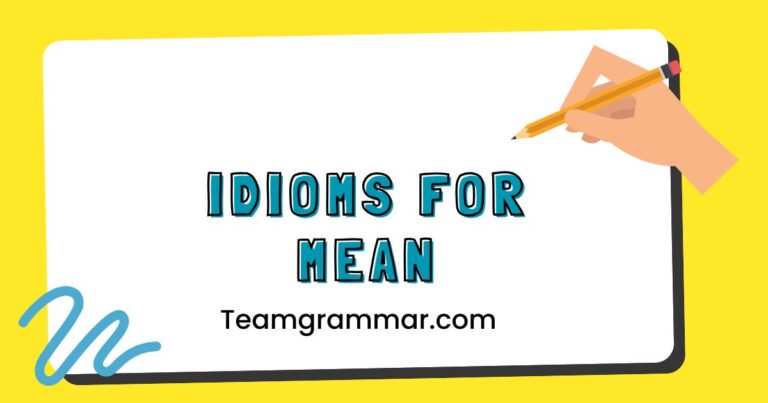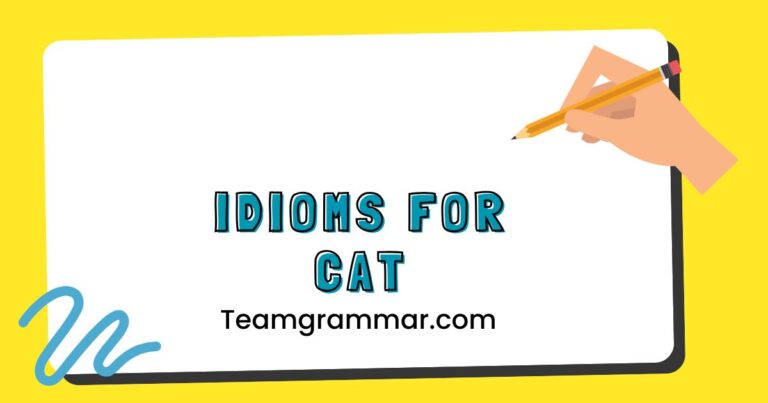23 Idioms for Good: Mastering Common English Expressions
Idioms are the spice of the English language, adding color and depth to everyday conversations and writing. Understanding idioms related to “good” enhances your comprehension and fluency.
This article provides a comprehensive guide to idioms associated with positive attributes, benefits, and desirable outcomes. Whether you’re an ESL learner or a native speaker aiming to refine your language skills, this resource offers definitions, examples, usage rules, and practice exercises to help you master these expressions.
Table of Contents
- Introduction
- Definition of Idioms for “Good”
- Structural Breakdown
- Types and Categories of Idioms for “Good”
- Examples of Idioms for “Good”
- Usage Rules for Idioms for “Good”
- Common Mistakes When Using Idioms for “Good”
- Practice Exercises
- Advanced Topics
- FAQ
- Conclusion
Introduction
Idioms are a fascinating aspect of any language, and English is no exception. They are expressions whose meanings cannot be understood simply by understanding the literal meanings of the individual words.
Idioms related to the theme of “good” are particularly useful for expressing approval, satisfaction, and positive outcomes. Understanding these idioms can help you communicate more effectively and add nuance to your speech and writing.
This article is designed for English language learners, students, and anyone interested in improving their understanding and use of English idioms.
Definition of Idioms for “Good”
Idioms for “good” are expressions that convey positive qualities, benefits, favorable outcomes, or general approval. These idioms often use figurative language to represent abstract concepts, making them richer and more expressive than literal alternatives.
They are a crucial part of everyday English, used in both formal and informal contexts.
Theclassificationof these idioms can be based on the type of positivity they express. For instance, some idioms highlight the benefits of something, while others focus on the positive qualities of a person or situation.
Thefunctionof these idioms is to add emphasis, color, and cultural context to communication. They provide a way to express complex ideas concisely and memorably.
Thecontextsin which these idioms are used vary widely, from casual conversations to formal presentations, depending on the specific idiom and the intended audience.
Structural Breakdown
Idioms, by definition, don’t follow standard grammatical rules in terms of literal meaning. Their structure is fixed, meaning the words cannot be changed or rearranged without altering or destroying the idiom.
However, understanding the grammatical structure of the sentences in which these idioms are used is essential. Most idioms function as phrases within a sentence, acting as nouns, verbs, adjectives, or adverbs.
For example, the idiom “in good hands” functions as an adjective phrase, describing a state of being well-cared for. The idiom “a good egg” functions as a noun, describing a person.
Recognizing these structural roles helps in correctly incorporating idioms into sentences. Some idioms may contain prepositions, verbs in specific tenses, or other grammatical elements that must be maintained for the idiom to retain its meaning.
It’s also important to understand that idioms often carry a particular connotation (positive, negative, or neutral) that affects their appropriateness in different contexts.
Types and Categories of Idioms for “Good”
Idioms related to “good” can be categorized based on the specific type of positivity they express. This categorization helps in understanding the nuances of each idiom and using them appropriately.
Idioms Describing Benefits
These idioms highlight the advantages or positive outcomes of a particular action, situation, or thing. They emphasize the usefulness or value of something.
Idioms Describing Positive Qualities
These idioms describe the admirable characteristics of a person, place, or thing. They focus on traits like kindness, honesty, reliability, or beauty.
Idioms Describing Favorable Outcomes
These idioms refer to situations where things turn out well or where success is achieved. They often express a sense of satisfaction or relief.
Examples of Idioms for “Good”
The following sections provide examples of idioms for “good,” categorized by the type of positivity they express. Each example includes the idiom, its meaning, and a sentence demonstrating its usage.
Examples Describing Benefits
The table below lists idioms that describe benefits. Each idiom is accompanied by its meaning and an example sentence.
Understanding these idioms will help you express the advantages and positive outcomes of various situations.
| Idiom | Meaning | Example Sentence |
|---|---|---|
| A good deal | A bargain or favorable agreement | We got a good deal on the new car because it was the end of the model year. |
| A good egg | A kind, reliable person | She’s a good egg; she always helps out whenever someone needs it. |
| Do someone good | To benefit someone | A little vacation would do you good. |
| For good | Permanently | He left the country for good after the scandal. |
| Good for you | Well done; congratulations | You finally got the promotion? Good for you! |
| In good shape | In a healthy or well-maintained condition | The car is in good shape despite its age. |
| In good spirits | In a cheerful mood | Despite the challenges, she remained in good spirits. |
| To the good | As a profit or advantage | After all the expenses, we still had $500 to the good. |
| Make good time | To travel quickly | We made good time on the highway and arrived early. |
| All to the good | Something that is a positive addition | If we can finish the project early, that’s all to the good. |
| Have a good run | To have a period of success or good fortune | The company had a good run for over a decade before the market changed. |
| Good riddance | Relief at someone’s departure | When he finally quit, we said, “Good riddance!” |
| On good terms | Having a friendly relationship | They remained on good terms even after the business partnership ended. |
| A good sport | Someone who accepts defeat graciously | Even though he lost, he was a good sport and congratulated the winner. |
| As good as new | Restored to its original condition | After the repairs, the old bicycle was as good as new. |
| Good thinking | A clever or sensible idea | “We should bring umbrellas.” “Good thinking! It might rain.” |
| Good Samaritan | Someone who helps others in need | The Good Samaritan stopped to help the stranded motorist. |
| Good graces | Favour or approval | He tried to get back into his boss’s good graces after the mistake. |
| A good head on one’s shoulders | To be intelligent and sensible | She has a good head on her shoulders and makes wise decisions. |
| In a good light | To present something or someone favorably | The documentary showed the politician in a good light. |
| Good value for money | Worth the price paid | This restaurant offers good value for money with its large portions and reasonable prices. |
| Good to go | Ready or prepared | Once the final checks are done, we’ll be good to go. |
| Good for nothing | Useless or worthless | He felt good for nothing after losing his job. |
| All in good time | Everything will happen when it’s meant to | Don’t rush things; it will all happen in good time. |
| Good call | A wise decision | Canceling the event due to the weather was a good call. |
| A good influence | Someone who has a positive effect on others | Her mentor was a good influence on her career. |
| Good breeding | Good manners and upbringing | His good breeding was evident in his polite behavior. |
| A good mixer | Someone who is sociable and gets along well with others | She’s a good mixer and always makes new people feel welcome. |
Examples Describing Positive Qualities
The table below includes idioms that describe positive qualities. These idioms are useful for expressing admiration and appreciation for the characteristics of people, places, or things.
| Idiom | Meaning | Example Sentence |
|---|---|---|
| A heart of gold | A kind and generous nature | She has a heart of gold and is always helping others. |
| True blue | Loyal and faithful | He’s true blue; you can always count on him. |
| A diamond in the rough | Someone with potential but lacking refinement | He was a diamond in the rough, but with training, he became an excellent leader. |
| Salt of the earth | A person of great integrity and honesty | My grandfather was salt of the earth, a man of unwavering principles. |
| As good as gold | Well-behaved and obedient | The children were as good as gold during the long car ride. |
| Fair dinkum | Genuine; honest (Australian slang) | He’s fair dinkum; you can trust what he says. |
| A safe pair of hands | A reliable and competent person | She’s a safe pair of hands when it comes to managing complex projects. |
| A good sort | A likeable and pleasant person | He’s a good sort; everyone enjoys working with him. |
| A gem | An outstanding or admirable person | Our new secretary is a gem; she’s efficient and friendly. |
| A brick | A reliable and supportive person | He was a brick when I was going through a tough time. |
| A good head | Intelligent and sensible | She has a good head and always makes sound decisions. |
| A good soul | A kind and compassionate person | He’s a good soul and always puts others before himself. |
| Golden-hearted | Extremely kind and generous | She’s golden-hearted and always willing to help those in need. |
| A good egg | A kind, reliable person | She’s a good egg; she always helps out whenever someone needs it. |
| A good man/woman | A person of good character | He’s a good man, respected by everyone in the community. |
| A stand-up guy/gal | An honest and reliable person | He’s a stand-up guy; you can always count on him to do the right thing. |
| A class act | Someone who behaves with grace and style | She’s a class act; always polite and professional. |
| Has their heart in the right place | To have good intentions | Even though he makes mistakes, he has his heart in the right place. |
| A good sport | Someone who accepts defeat graciously | Even though he lost, he was a good sport and congratulated the winner. |
| A good influence | Someone who has a positive effect on others | Her mentor was a good influence on her career. |
| A good mixer | Someone who is sociable and gets along well with others | She’s a good mixer and always makes new people feel welcome. |
| A ray of sunshine | A cheerful and optimistic person | She’s a ray of sunshine, always brightening up the room. |
| A good listener | Someone who pays attention and understands others | He’s a good listener and always offers thoughtful advice. |
| A good provider | Someone who takes care of their family | He is a good provider and always makes sure his family has what they need. |
| A good judge of character | Someone who can accurately assess people’s personalities | She is a good judge of character and can usually tell if someone is being dishonest. |
| A good soul | A kind and compassionate person | He’s a good soul and always puts others before himself. |
| A good sort | A likeable and pleasant person | He’s a good sort; everyone enjoys working with him. |
Examples Describing Favorable Outcomes
The table below presents idioms that describe favorable outcomes. These idioms are useful for expressing satisfaction, relief, or success in various situations.
| Idiom | Meaning | Example Sentence |
|---|---|---|
| Come up roses | To turn out well in the end | Despite the initial difficulties, everything came up roses. |
| All’s well that ends well | A situation is satisfactory if the final result is good | The project was delayed, but all’s well that ends well, and we delivered it successfully. |
| Land on one’s feet | To recover quickly from a difficult situation | Even after losing his job, he managed to land on his feet and start a new business. |
| Have it made | To be assured of success or happiness | Once he inherited the family fortune, he had it made. |
| Get off scot-free | To escape punishment or consequences | The thief managed to get off scot-free due to a technicality in the law. |
| A stroke of luck | A sudden piece of good fortune | Finding that rare book at the flea market was a stroke of luck. |
| A lucky break | A fortunate opportunity | Getting the interview was a lucky break for her career. |
| Come out on top | To be victorious or successful | Despite the competition, our team came out on top. |
| Hit the jackpot | To have a great success or gain a large profit | When their app went viral, they hit the jackpot. |
| Everything’s coming up Millhouse | Everything is going well (often used humorously) | I got a promotion, my favorite team won, and I found $20 on the street – everything’s coming up Millhouse! |
| Smooth sailing | Easy and without problems | Once we got past the initial setup, it was smooth sailing. |
| In the clear | Free from suspicion or danger | After providing the evidence, he was in the clear. |
| Home free | Certain to succeed | Once we finished the first phase, we were home free. |
| On easy street | Living comfortably without financial worries | After winning the lottery, they were on easy street. |
| Laughing all the way to the bank | Making a lot of money easily | With their innovative product, they were laughing all the way to the bank. |
| Have the Midas touch | To be successful in everything one does | She has the Midas touch; every business she starts becomes profitable. |
| Be sitting pretty | To be in a comfortable or advantageous position | With their investments paying off, they were sitting pretty. |
| Live the life of Riley | To live a carefree and luxurious life | After retiring, he planned to live the life of Riley, traveling and enjoying his hobbies. |
| Strike gold | To discover something valuable or successful | They struck gold with their new marketing campaign. |
| Be born with a silver spoon in one’s mouth | To be born into wealth and privilege | He was born with a silver spoon in his mouth and never had to worry about money. |
| Get a lucky break | To receive an unexpected opportunity | She got a lucky break when the director saw her performance in the small theater. |
| Turn out for the best | To have a positive outcome in the end | Even though it was a difficult experience, it turned out for the best. |
| Find your feet | To become confident and successful in a new situation | It took him a while to find his feet in the new job, but now he’s thriving. |
| Hit it big | To achieve great success or fame | The band hit it big with their first album. |
| Make a killing | To make a large profit quickly | They made a killing in the stock market during the boom. |
| Be in the pink | To be in good health | After a week of rest, she was in the pink again. |
| Have all the luck | To consistently experience good fortune | He seems to have all the luck; everything always goes his way. |
Usage Rules for Idioms for “Good”
Using idioms correctly requires understanding their specific meanings and contexts. Here are some general rules to follow:
- Context Matters: Always consider the context in which you’re using an idiom. Some idioms are more appropriate for formal settings, while others are better suited for casual conversations.
- Fixed Structure: Idioms have a fixed structure, which means you cannot change the words or their order. Altering an idiom can make it nonsensical.
- Audience Awareness: Be mindful of your audience. Some idioms may not be familiar to non-native speakers or people from different cultural backgrounds.
- Overuse: Avoid overusing idioms, as it can make your language sound unnatural or forced.
- Nuance: Pay attention to the nuances of each idiom. Some idioms may have subtle differences in meaning or connotation.
For example, using “good riddance” to express relief at someone’s departure is appropriate in informal settings but may be considered rude in formal contexts. Similarly, the idiom “a heart of gold” should only be used to describe someone who is genuinely kind and generous.
Common Mistakes When Using Idioms for “Good”
Several common mistakes can occur when using idioms for “good.” Being aware of these errors can help you avoid them.
| Incorrect | Correct | Explanation |
|---|---|---|
| He is a gold heart. | He has a heart of gold. | The idiom is “a heart of gold,” not “a gold heart.” |
| They said good leave to him. | They said good riddance to him. | The idiom is “good riddance,” not “good leave.” |
| She’s in a good figure. | She’s in good shape. | The idiom is “in good shape,” not “in good figure.” |
| It will make you good. | It will do you good. | The idiom is “do you good,” not “make you good.” |
| He left for well. | He left for good. | The idiom is “for good,” meaning permanently. |
| Good on you! | Good for you! | The correct idiom is “Good for you!” to express congratulations. |
| We did a good work. | We did a good job. | While “work” can be correct, “job” is often used in this context. |
| That’s a good saying. | That’s a good call. | “Good call” refers to a wise decision, not a saying. |
| He is very salt of earth. | He is the salt of the earth. | The idiom is “the salt of the earth”. |
| She has a good head on shoulder. | She has a good head on her shoulders. | The correct idiom is “a good head on her shoulders”. |
Practice Exercises
Test your understanding of idioms for “good” with the following exercises. Choose the correct idiom to complete each sentence.
| Question | Options | Answer |
|---|---|---|
| 1. She always helps others; she has _____. | a) a golden heart b) a heart of gold c) a gold heart | b) a heart of gold |
| 2. After the initial problems, everything _____. | a) came up flowers b) came up roses c) came up daisies | b) came up roses |
| 3. He is a reliable person; he’s _____. | a) true red b) true green c) true blue | c) true blue |
| 4. They managed to _____ after the business failed. | a) land on their head b) land on their feet c) land on their toes | b) land on their feet |
| 5. He escaped without punishment; he _____. | a) got off free b) got off scot-free c) got off easy | b) got off scot-free |
| 6. She is a very kind person, a real _____. | a) good egg b) good fruit c) good vegetable | a) good egg |
| 7. He’s been _____ since he won the lottery. | a) on easy street b) on hard street c) on bumpy street | a) on easy street |
| 8. Canceling the picnic because of the rain was a _____ . | a) good thought b) good idea c) good call | c) good call |
| 9. She’s always cheerful and brings joy; she’s a _____. | a) sunbeam b) ray of sun c) ray of sunshine | c) ray of sunshine |
| 10. His manners and upbringing show his _____. | a) good creation b) good generation c) good breeding | c) good breeding |
Advanced Topics
For advanced learners, exploring the origins and cultural contexts of idioms can provide a deeper understanding. Many idioms have historical roots or are specific to certain regions or dialects.
Researching the etymology of idioms can reveal fascinating insights into the evolution of language and culture.
For instance, the idiom “salt of the earth” comes from the Bible and refers to people who are considered to be the fundamental goodness of society. Understanding this origin adds depth to the idiom’s meaning and usage.
Similarly, idioms like “fair dinkum” are specific to Australian English, reflecting the unique cultural identity of that region.
Another advanced topic is the use of idioms in literature and rhetoric. Authors often use idioms to create vivid imagery, convey character traits, or add humor to their writing.
Analyzing how idioms are used in different literary works can enhance your appreciation of both language and literature.
FAQ
- What is an idiom?
An idiom is a phrase or expression whose meaning cannot be understood from the literal meanings of its individual words. It’s a figurative way of expressing something. - Why are idioms important in English?
Idioms are essential for understanding and communicating effectively in English. They add color, nuance, and cultural context to conversations and writing. - How can I learn idioms effectively?
The best way to learn idioms is through exposure and practice. Read widely, listen to native speakers, and try to use idioms in your own speech and writing. - Are idioms the same in all English-speaking countries?
No, idioms can vary between different English-speaking countries. Some idioms are specific to certain regions or dialects. - Can I change the words in an idiom?
No, idioms have a fixed structure, and changing the words can alter or destroy their meaning. - How do I know when to use an idiom?
Consider the context, your audience, and the specific meaning of the idiom. Some idioms are more appropriate for formal settings, while others are better suited for casual conversations. - What should I do if I don’t understand an idiom?
Look it up in a dictionary or ask a native speaker for clarification. Pay attention to the context in which the idiom is used. - Is it okay to overuse idioms?
No, overusing idioms can make your language sound unnatural or forced. Use them sparingly and appropriately. - How can I practice using idioms?
Try to incorporate idioms into your everyday conversations and writing. You can also do exercises and quizzes to test your understanding. - Are there any resources for learning idioms?
Yes, there are many dictionaries, websites, and books dedicated to idioms. You can also find idioms in literature, movies, and TV shows. - What is the difference between an idiom and a proverb?
An idiom is a phrase with a figurative meaning, while a proverb is a short, well-known saying that expresses a general truth or piece of advice. - How do I avoid making mistakes when using idioms?
Pay attention to the specific meaning and context of each idiom. Be aware of common mistakes and practice using idioms correctly.
Conclusion
Mastering idioms for “good” is a valuable step in enhancing your English language skills. These expressions add depth, color, and cultural context to your communication, making you sound more natural and fluent.
By understanding the definitions, usage rules, and common mistakes associated with these idioms, you can confidently incorporate them into your everyday speech and writing. Remember to practice regularly, pay attention to context, and be mindful of your audience.
With dedication and effort, you’ll be well on your way to mastering these fascinating expressions.


